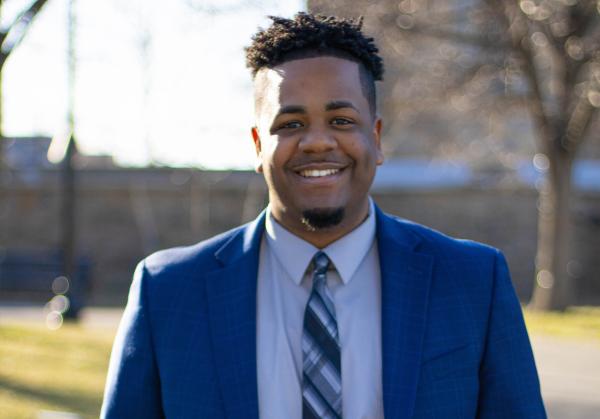April 19, 2023

City Hall aide Henry Santana is running for one of the four at-large seats on the City Council. (Photo via Santana campaign)
While the City Council was bickering yet again over the redrawing of political boundaries, an aide to Mayor Wu was busy launching his campaign for one of the four at-large slots.
Henry Santana, a Dorchester resident who grew up in public housing in Mission Hill after immigrating from the Dominican Republic, has served as Wu’s director of civic organizing since April 2022. In that role, he reported to Brianna Millor, the administration’s chief of community engagement, and frequently sat down with civic organizations and community leaders to get a sense of what they’re looking for from City Hall.
“I’m a big believer in community process,” Santana said last week. “The work I’m going to be able to do if I’m elected, that’s being informed by community.”
A Lasell University graduate, he has worked at MFS Investment Management, and served as field director for District 8 Councillor Kenzie Bok’s 2019 campaign before becoming her City Hall office’s director of operations, and the liaison to the Fenway and Mission Hill after she was elected. He currently lives on Columbia Point.
If elected, he said, he’ll be an advocate for working families and low-income people. “I understand the challenges that our residents face. It’s time we have a voice on the council for that,” he said.
Bok, his former boss, endorsed Santana on Wednesday. She noted the COVID-19 pandemic hit in the third month of her first term, and Santana immediately knew which families in Mission Hill needed food deliveries. Tobin School teachers reached out to him when their students needed laptops in order to keep their education going at home.
“I know he would bring that passion and a really strong desire to include people, and get people the services and opportunities they need and deserve in an unmatched way,” she said.
Her District 8 seat, which she is leaving to take the top job at the Boston Housing Authority, includes some of the city’s wealthiest institutions and low-income communities, stretching from Beacon Hill to Mission Hill. Santana, she said, is someone who can serve as a bridge citywide as an at-large councillor. “Bridge builders are what we need and I think he could bring that ethos to the Council in a wonderful and healthy way,” she said.
Santana will officially leave his Wu administration job at the end of April, and if he gathers enough signatures, he’ll join the incumbents, and maybe a few others, on the ballot this year. Only the nine district seats and four at-large Council seats go before the voters this year; the next mayor’s race is not on the books until 2025.
While Wu is not on the ballot, her policies and proposals, which push for rent control and a “Green New Deal” for the city, may well be. And the mayor herself may be getting involved, publicly or behind the scenes.
Boston mayors tend to have an uneven track record in City Council races. Tom Menino and Marty Walsh, who both won handily citywide, couldn’t resist getting involved at the local level. But Menino unsuccessfully backed Frank Baker’s rival, John O’Toole, in District 3’s 2011 showdown, and Walsh supported a close friend, Stephen Passacantilli, over now state Sen. Lydia Edwards in the District 1 battle in 2017.
Santana has not yet asked for Wu’s endorsement in the at-large race. “I do believe in Mayor Wu’s vision,” he said. “She’s been nothing but supportive and really helpful ever since I’ve started working for her and throughout this process.”
Topping the Ticket Sweepstakes
All four of the at-large incumbents are running for re-election, and they are probably going to be more focused on topping the ticket rather than fending off challengers in an off-year race. Ticket-toppers get bragging rights and the accompanying chatter of what could be next.
At a Beacon Hill fundraiser for Erin Murphy at the end of January, Baker did the introduction, saying the goal this year is for her to top the ticket. The crowd at Carrie Nation, a restaurant located between the State House and City Hall, included state auditor Diana DiZoglio, Dorchester state Rep. Dan Hunt, former city clerk and District 3 councillor Maureen Feeney, and Mary Tamer, a former City Council candidate from West Roxbury and former School Committee member.
In 2021, longtime Councillor At-Large Michael Flaherty grabbed the most votes with 62,602; fellow incumbent Julia Mejia was close behind with 62,058. Newcomer Ruthzee Louijeune was next with 54,898, and Murphy made it past the cutoff with 43,076. David Halbert finished fifth, with 42,765. Voters can make up to four choices in the polling booth.
Of course, 2021 also had a mayoral race on the ballot. In 2019, when it was just the City Council, the totals and some of the names were different in the at-large race. That November, then-Councillor Wu was the ticket-topper, with 41,664 votes, and Annissa Essaibi George, her future mayoral rival, came in with 34,109. Flaherty was next with 33,284. Mejia won by just one vote over Alejandra St. Guillen. Murphy was also on the ballot, but fell short, garnering just 16,867 votes.
As is customary, the incumbents have been busy filling up their campaign accounts. At the end of March, Flaherty had $205,000 in cash on hand, while Murphy and Louijeune each had just over $65,000. Mejia registered $35,000.
In District 3, Baker has $74,000, while his two challengers, teacher Joel Richards has $26,000, and community activist Jennifer Johnson $15,000.
A key date on the 2023 election calendar comes and goes this week: April 19 is the first day that candidates can apply for nomination papers. At-large candidates must get 1,500 signatures from registered voters, while district candidates need 200.
So two days after the Boston Marathon, incumbents and challengers started their own long-distance run, with miles to go until November.


